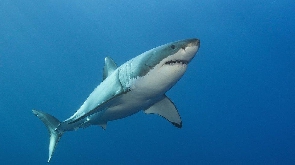Humans dey well known as super predators but for di first time, scientists don put a figure to back am up.
We dey exploit around one third of all wild animals for food, medicines or to keep as pets, putting almost half at risk of extinction, dem tok.
E make us hundreds of times more dangerous dan natural predators such as di great white shark.
And dem dey warn of ogbonge consequences for di whole ecosystems.
"Di size and scale of wetin we find surprise us," Dr Rob Cooke of di UK Centre for Ecology and Hydrology for Wallingford, Oxfordshire tok.
"Human beings get plenty use for animals but we need to move towards sustainable human-nature relationships across di globe."
Di researchers analyse data on almost 50,000 different wild mammals, birds, reptiles, amphibians and fish wey human beings dey harvest for food, medicines or clothing, or collect from di wild for di pet trade.
Dem find out say we dey use or trade 14,663 species - about one third of all vertebrates - and dey drive 39% of dem towards extinction.
And our impact dey up to 300 times greater dan dat of top predators such as di great white shark, lion or tiger.
Humanity now get a bigger influence on oda animals on di planet dan at any time in history,
We dey enter di Anthropocene, di period during which human activity don be di dominant influence on climate and di environment.
Domesticated animals now make up di majority of animal species on land, and e dey shape di natural world.
Di researchers warn say continued overexploitation of wild animals go get "ogbonge consequences for biodiversity and ecosystem function".
Dem publish di research for Communications Biology.
BBC Pidgin of Saturday, 1 July 2023
Source: BBC
















